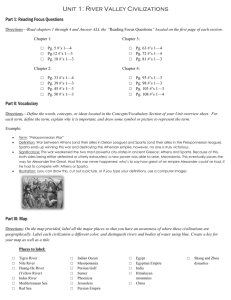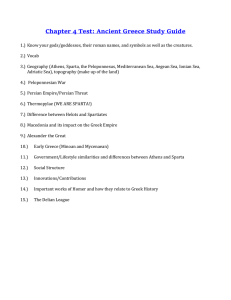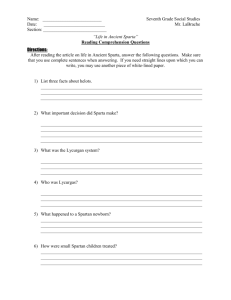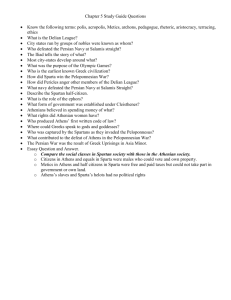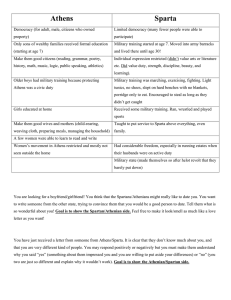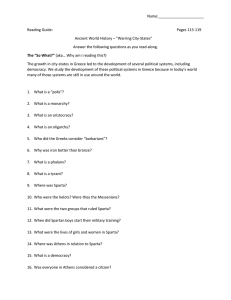Name _______________________________________________ Period _____________
advertisement
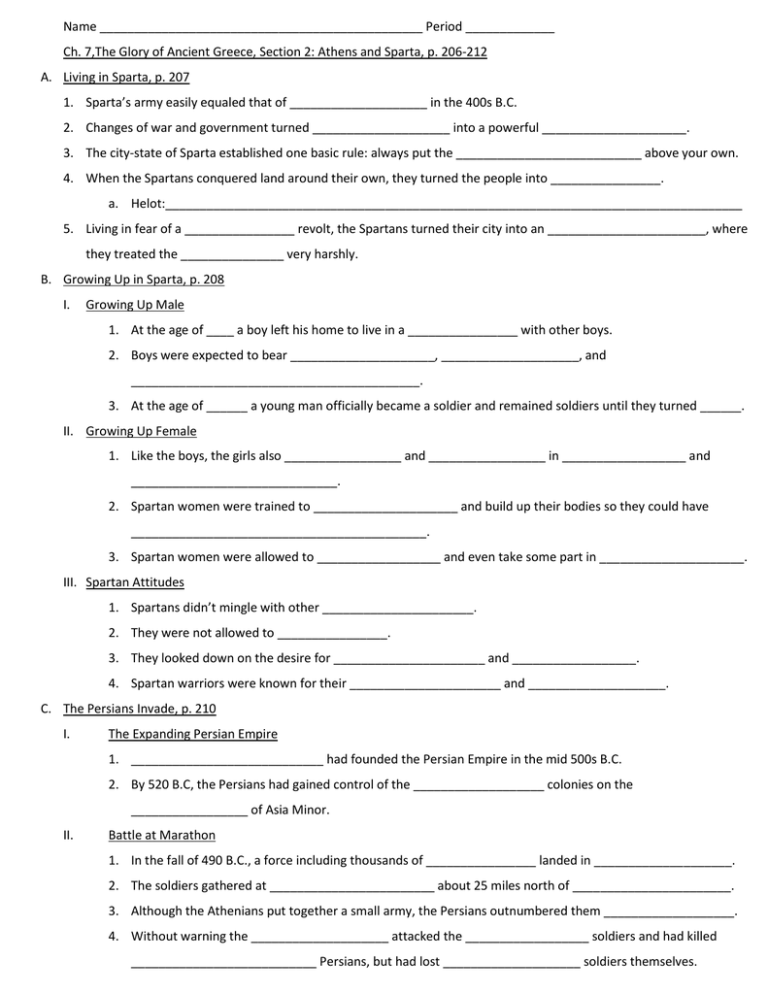
Name _______________________________________________ Period _____________ Ch. 7,The Glory of Ancient Greece, Section 2: Athens and Sparta, p. 206-212 A. Living in Sparta, p. 207 1. Sparta’s army easily equaled that of ____________________ in the 400s B.C. 2. Changes of war and government turned ____________________ into a powerful _____________________. 3. The city-state of Sparta established one basic rule: always put the ___________________________ above your own. 4. When the Spartans conquered land around their own, they turned the people into ________________. a. Helot:____________________________________________________________________________________ 5. Living in fear of a ________________ revolt, the Spartans turned their city into an _______________________, where they treated the _______________ very harshly. B. Growing Up in Sparta, p. 208 I. Growing Up Male 1. At the age of ____ a boy left his home to live in a ________________ with other boys. 2. Boys were expected to bear _____________________, ____________________, and __________________________________________. 3. At the age of ______ a young man officially became a soldier and remained soldiers until they turned ______. II. Growing Up Female 1. Like the boys, the girls also _________________ and _________________ in __________________ and ______________________________. 2. Spartan women were trained to _____________________ and build up their bodies so they could have ___________________________________________. 3. Spartan women were allowed to __________________ and even take some part in _____________________. III. Spartan Attitudes 1. Spartans didn’t mingle with other ______________________. 2. They were not allowed to ________________. 3. They looked down on the desire for ______________________ and __________________. 4. Spartan warriors were known for their ______________________ and ____________________. C. The Persians Invade, p. 210 I. The Expanding Persian Empire 1. ____________________________ had founded the Persian Empire in the mid 500s B.C. 2. By 520 B.C, the Persians had gained control of the ___________________ colonies on the _________________ of Asia Minor. II. Battle at Marathon 1. In the fall of 490 B.C., a force including thousands of ________________ landed in ____________________. 2. The soldiers gathered at ________________________ about 25 miles north of _______________________. 3. Although the Athenians put together a small army, the Persians outnumbered them ___________________. 4. Without warning the ____________________ attacked the __________________ soldiers and had killed ___________________________ Persians, but had lost ____________________ soldiers themselves. III. Conflict and the Athenian Empire, 211 1. While Persia was distracting the Greek city-states, they were no longer _______________ each other. 2. Their victory over the ________________ increased the Greeks’ sense of their own _____________________. 3. __________________ emerged from the war as the most powerful __________________ in Greece. 4. The years following the Persian Wars were the ____________________________ of Athens. D. Sparta and Athens at War, p. 212 I. The Peloponnesian War 1. Allies of Athens paid ___________________ to the city state for ____________________, in case the ___________________ caused more trouble. 2. Other city-states began to fear and resent _________________. 3. They looked to _______________________ which had not joined the alliance for ______________________. 4. Sparta formed the ____________________________ League, named after ________________________, the southern Greek _________________ where Sparta was located. 5. In 431 B.C., Sparta and _________________ fought against ____________________ and its allies, beginning the _______________________________. a. Peloponnesian War: __________________________________________________________________. 6. ___________________________ let the people from surrounding countryside move inside the city walls. 7. The overcrowded conditions led to a __________________. a. Plague: _____________________________________________________________________________ 8. By the time the plague ended ______ years later, about _________ of the people of _____________ died, including _________________________. II. Fall of Athens 1. ______________ never recovered from its losses during the ____________. 2. _______________________ allied itself to its former common enemy to have the advantage of the ________________ navy. 3. In 405 B.C., with their new allies, _____________________ staged a _________________. a. Blockade: ___________________________________________________________________________ 4. The ____________________ surrounded and closed the _________________ where ____________________ received ___________________________. 5. _____________________ and ______________, the ____________________ surrendered. 6. The victorious _____________________ knocked down the walls of ___________________, destroyed its ______________________, and decimated its empire. 7. _______________ never again dominated the Greek world.
